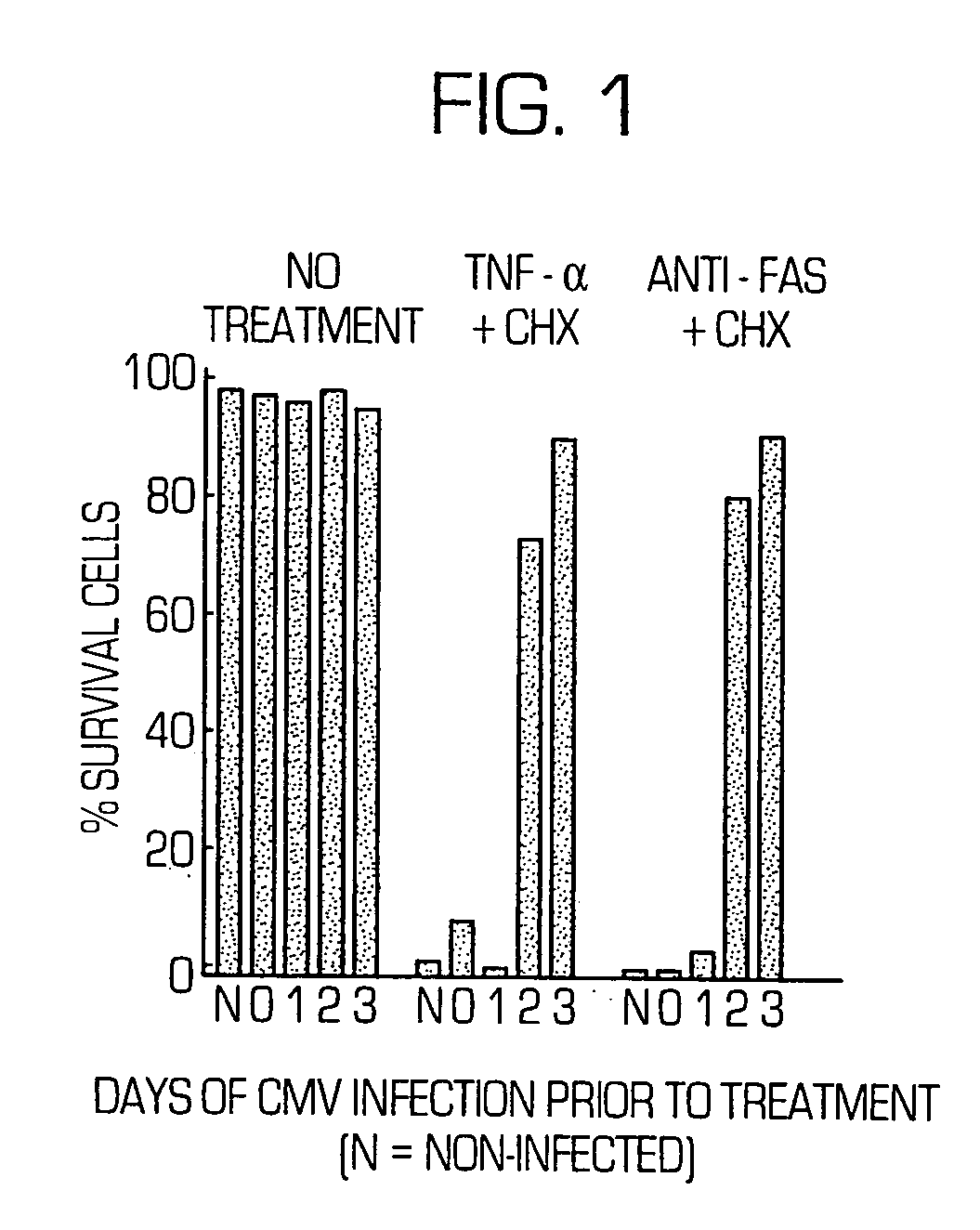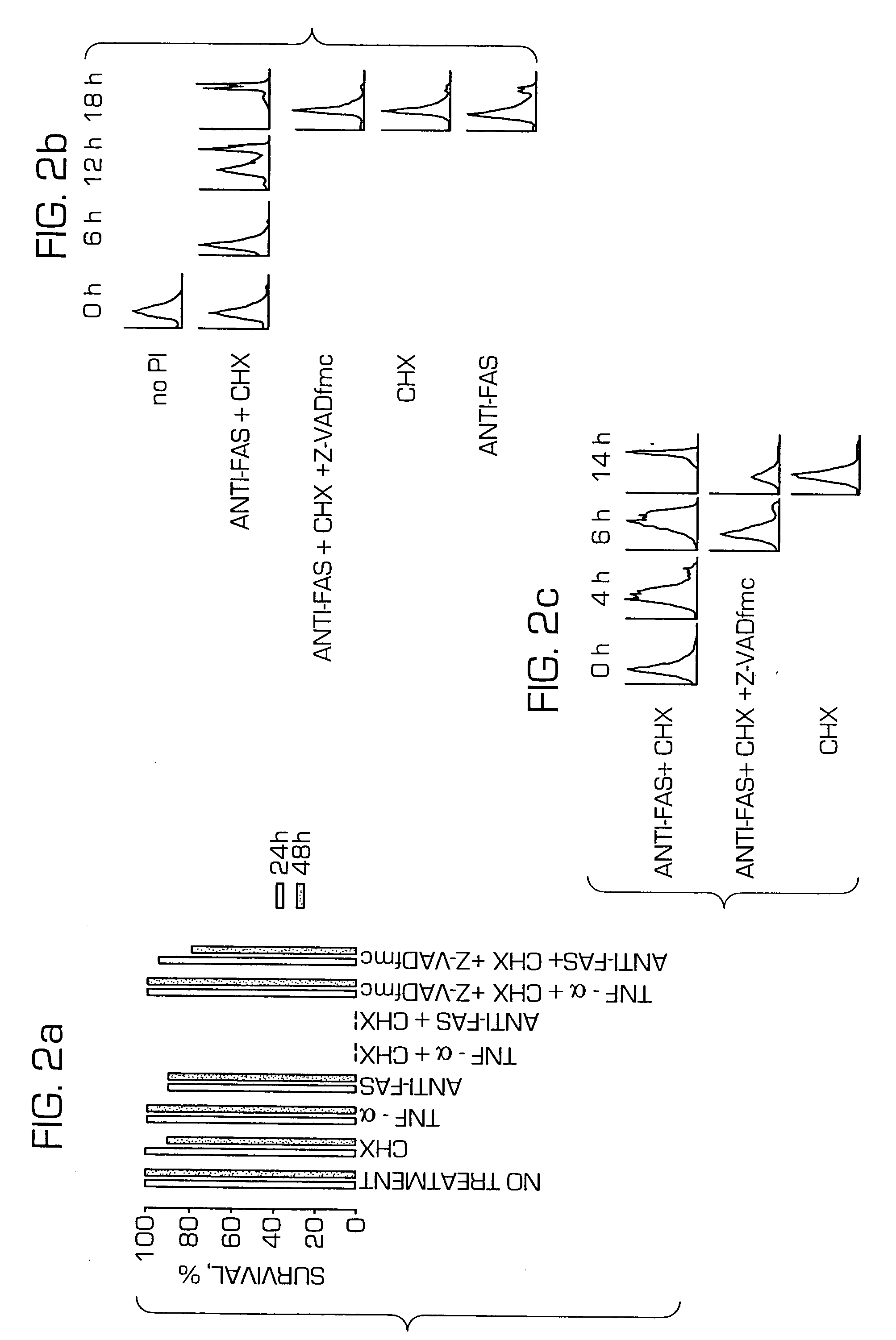Compounds, methods of screening, and in vitro and in vivo uses involving anti-apoptotic genes and anti-apoptotic gene products
a gene and anti-apoptosis technology, applied in the field of cell physiology, can solve the problems of inappropriate or premature cell death or inappropriate cell proliferation, limited treatment options available, viral polypeptides that did not suppress apoptosis, etc., and achieve the effect of enhancing the stability, growth and/or productivity of cells
- Summary
- Abstract
- Description
- Claims
- Application Information
AI Technical Summary
Benefits of technology
Problems solved by technology
Method used
Image
Examples
experimental examples
[0343] The invention will now be illustrated by reference to non-limiting examples. Unless otherwise stated, all percents, ratios, parts, etc. are by weight.
example 1
Induction and Detection of Apoptotic Activity.
[0344] Tumor necrosis factor receptor 1 (TNF-R1)-mediated apoptosis was induced by exposure of HeLa and MRC-5 cells to tumor necrosis factor-α (TNF-α) (Sigma, 10-60 ng / mL)+CHX (10-30 μg / mL). Fas-mediated apoptosis was induced by exposure of cells to an anti-Fas antibody (Coulter, 7C11 antibody at 0.2-4 μg / mL)+CHX (10-30 μg / mL). The degree of cell death was determined by the visual scoring of surviving cells, in representative fields, under a phase microscope. A similar degree of cell death occurred in fibroblasts when examined 5 to 28 h after the start of exposure, or a similar degree of cell death occurred in HeLa cells when examined 9-28 h after the start of exposure. Further, a similar degree of cell death for a given reagent was produced when any concentration within the range indicated above was used.
[0345] The time-course of apoptosis was also analyzed by examining the expression of phosphatidylserine on the cell surface, as det...
example 2
Detection of Intracellular Polypeptides.
[0349] Cells were trypsinized, washed in Tris buffered saline, resuspended in a lysis buffer (150 mM NaCl, 5 mM EDTA, 50 mM Tris.HCl pH 8.0, 1% Triton X-100), freshly supplemented with phenylmethylsulfonyl fluoride (0.1 mM), leupeptin (1 μg / mL) and pepstatin (1 μg / mL), incubated on ice for 30 minutes, and centrifuged at 16,000 g for 15 minutes, at 4° C. Cytochrome c and procaspase 9 were detected in S-100 fractions of cells (Li et al., 1997, which is incorporated herein by reference).
[0350] The intracellular polypeptides were detected by Western blot analysis. Samples containing protein were electrophoretically resolved under reduced conditions, on Laemmli SDS-PAGE (Novex), after equal amounts of protein were loaded per well of the gel, detected using a standard Western blot protocol and a luminol-based ECL Western Blotting system (Amersham). The following antibodies were used in the Western blot analysis: anti-human Bid C-20 (Santa Cruz Bi...
PUM
| Property | Measurement | Unit |
|---|---|---|
| temperature | aaaaa | aaaaa |
| temperature | aaaaa | aaaaa |
| pH | aaaaa | aaaaa |
Abstract
Description
Claims
Application Information
 Login to View More
Login to View More - R&D
- Intellectual Property
- Life Sciences
- Materials
- Tech Scout
- Unparalleled Data Quality
- Higher Quality Content
- 60% Fewer Hallucinations
Browse by: Latest US Patents, China's latest patents, Technical Efficacy Thesaurus, Application Domain, Technology Topic, Popular Technical Reports.
© 2025 PatSnap. All rights reserved.Legal|Privacy policy|Modern Slavery Act Transparency Statement|Sitemap|About US| Contact US: help@patsnap.com



